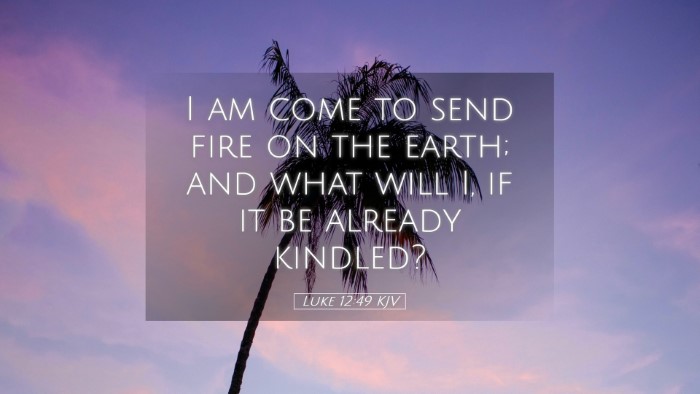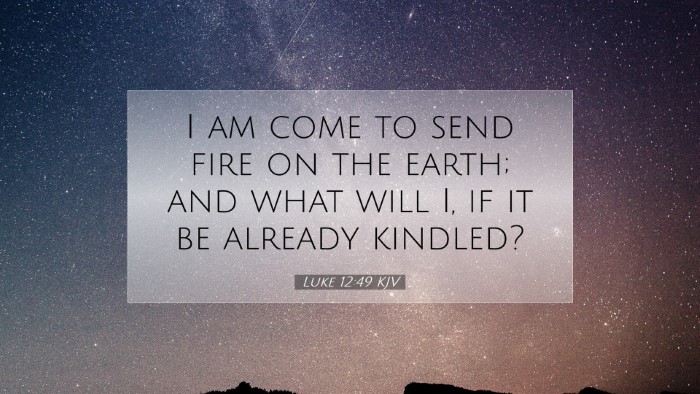Commentary on Luke 12:49
Luke 12:49 states, "I am come to send fire on the earth; and what will I, if it be already kindled?" This verse encapsulates profound themes of judgment, division, and the transformative power of Jesus' message.
Contextual Insights
This passage occurs within a broader discourse in which Jesus addresses his disciples and the surrounding crowd, elucidating the implications of his mission and the response it demands from humanity.
The Purpose of Jesus’ Coming
Matthew Henry articulates that Jesus came to set ablaze a fervor for righteousness, while simultaneously highlighting the divisions that the gospel would create. The "fire" mentioned represents both purification and judgment. It serves to ignite a spirit of passion among believers and illuminate truths that lead to reform.
The Nature of the Fire
According to Albert Barnes, the fire symbolizes the divine judgment and the transformative work of the Holy Spirit. Jesus, as the light of the world, ignites faith, yet this very illumination can lead to controversy. The "already kindled" nature of this fire suggests that a hostile environment preexists the coming of Christ, a testament to the world's rejection of the light.
Spiritual Division
Adam Clarke articulates that Jesus knew his ministry would incite divisions, even among families and close relationships. The division is not merely physical but spiritual, as the light of Christ reveals the depths of the human heart and the stark contrast between righteousness and sin.
Theological Reflections
This passage necessitates a deep theological reflection on the nature of Christ’s work. Jesus as the fire can be viewed in multiple dimensions:
- Purging Fire: It purges sin from the hearts of believers.
- Judging Fire: It stands as a warning of the divine judgment that befell unrepentant sinners.
- Illuminating Fire: It reveals truth in a dark world, guiding believers toward the righteousness of God.
The Implications for Believers
As pastoral leaders, understanding the implications of this "fire" is crucial for teaching congregations about the cost of discipleship. Jesus emphasizes the urgency and the seriousness of responding to his message. Believers are called to engage in the world as bearers of this divine fire, armed with the knowledge of its purifying potential.
Call to Discipleship
In light of this fire, discipleship becomes an act of radical commitment, often leading to societal tensions. Matthew Henry stresses that following Jesus may bring trials and divisions, encouraging believers to count the cost.
Practical Applications
The commentary sheds light on practical applications for pastors and leaders in their ministry. The call is twofold:
- Proclaim the True Gospel: Like Jesus, pastors must speak boldly about both the love and the judgment of God, providing a balanced view of the gospel.
- Create Awareness of Division: Pastors should prepare congregations for the inevitable conflicts that arise from holding onto the truths of Christ, fostering resilience and unity within the body of believers.
Conclusion
The profundity of Luke 12:49 cannot be overstated; it challenges students and scholars alike to comprehend the multifaceted nature of Christ's mission. He brings fire to the earth, which serves as a metaphor for judgment, passion, and spiritual awakening. Thus, it is imperative for the faithful to grasp the transformative potential of this fire and to embrace their role as torchbearers of the gospel in a world longing for both illumination and redemption.


